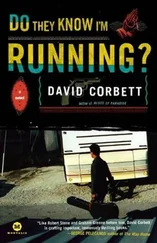Abatangelo reached for the gun barrel. It scalded his hand and he let go, howling. The boy went to aim again and Abatangelo swatted the barrel, reached for the stock and wrestled it away in one hard pull. Two-handed, he hurled the weapon out into the flame-spangled water.
He reached out his good hand. “Come,” he said. The boy recoiled in dread. Forsaking English, Abatangelo said, “Venga. Venga!” He looked off in the directions of the approaching sirens. He mimed running and pointed to the hurricane fence. The boy cringed, huddling against the van’s far wall. No, Abatangelo thought. This ain’t gonna happen. He scrambled into the van, grabbed the boy, threw him over his shoulder and jumped back out onto the gravel and started to run as the boy kicked halfheartedly, squirming. Reaching the end of the low wall, he set the boy down, shoving him in the direction of the hurricane fence. He pointed and shrieked in the boy’s face: “Run!”
The boy lifted his arms, put his wrists to the side of his head, weeping. Abatangelo could see the lights of an approaching cruiser a half mile up from the marina. There was no more time. He turned and ran himself, reaching the incinerator in a half dozen lurching strides. Seeing the damage to the brick from gunfire, he marveled at his own survival. He gathered up the two other cameras, left the rest of the equipment and made off in a crouching run for the fence, heading for a spot twenty yards away from the dead man left there hanging.
It wasn’t till he reached the fence that he realized the boy was behind him. Panting, they stood there together as the cruiser reached the marina’s far end. Abatangelo made a stirrup with his hands, fitting the burned one under the other, gestured with his head and shouted, “Up.” The boy inserted his foot, Abatangelo snarled from the pain but heaved him upward and the boy latched on to the fence top, brought his leg over and dropped on the far side. He did not flee. His eyes still dripping tears, he gestured with his hands for Abatangelo to follow. Abatangelo wrapped his camera straps around his neck and scaled up after.
Once he dropped clear on the other side, the boy grabbed his sleeve, but Abatangelo, raising his hand, said, “Momento.” Knees bent, he hurried down the fence line to the man left dead. Legs dangling on the far side, torso impaled on the top, his head gazed down lifelessly at the side from which freedom had beckoned. Abatangelo knew this was the shot he had to take, the one that defined the whole insane business. He checked the camera; he had two frames left. He crouched down, armed the flash and shot twice, the lens pointing straight upward. The flash erupted like lightning, illuminating the vacant eyes, the horrific maw. The film rewound in a humming whirl. Abatangelo rose, stepped back and collided with the boy.
“Roberto,” the boy whispered, staring up at the body.
The highway was thick with police cruisers wailing toward the marina. Abatangelo wound his way along back roads, weaving through the wooded hills to the south of the strait, beyond the refineries and the Delta Highway. The boy rode beside him silently, staring out the window, hands folded in his lap. They reached downtown Martinez fifteen minutes shy of five o’clock. Given winter light, sunrise remained an hour off. Streetlights flashed in the misty predawn dark. The streets were empty.
Abatangelo pulled to a stop and finally took a moment to wrap a handkerchief around his scalded hand. Taking heart from the fact no blistering had appeared, he reached across the seat for the glove compartment. He pulled out the plasticine envelope containing his pictures of Shel. Producing one, he held it up for the boy and said, “Dónde?” Where?
The boy looked lost, sitting there chewing his hand in the intermittent light-and-dark of the flashing overhead streetlight. His brow furrowed, he looked from the picture to Abatangelo and back again. He shrugged and shook his head.
“Try,” Abatangelo said, pushing the picture closer to the boy’s face. Licking his lips, the boy studied the image closely. He shook his head again.
“Do you know her?” He fished his memory for the Spanish word for “know,” then ended up just pointing to her image and saying, “Sí?”
The boy continued shaking his head. Abatangelo wasn’t sure he’d ever stopped.
“Okay,” he said gently, surrendering. “All right.”
The boy looked out at the empty corner, the bus terminal to one side, a shabby park to the other. Abatangelo had no idea how close to home the boy was, or how he’d get back. Wondering how he should convey that he’d drive the boy wherever he needed to go, he reached up with his burned hand, wrapped in his handkerchief, and dabbed at the side of his own face. Blood still seeped from the wound inflicted by the splintered brick sent flying in ricochet by the chain gun. This, added to his other wounds, made him look vaguely menacing, he supposed. What could be more menacing, after all, than a man lucky to be alive?
The boy turned around and stared at him. In time, licking his lips again, the boy said, “Gracias.”
Abatangelo smiled, inspecting the handkerchief for pus. “De nada.” He fished for the words to say he was sorry about his friend, but his memory refused to oblige so he said it in English. The boy blinked, glanced sidelong at him, then looked out the window again.
“Cómo está?” Abatangelo ventured.
The boy chuckled bitterly. “Escantado de la vida,” he said, gesturing with a mocking wave of his hand.
Abatangelo studied the boy more closely. Terror lingered in his eyes, he couldn’t sit still. How long, Abatangelo wondered, before the macho lust for revenge appears. He wanted to tell the boy, Take a tip from me: Don’t. Remember what happened tonight, all of it, the false promises, the bravado, the sloganeering, the butchery. Take it to your grave. He wanted to reach across the car, grab the boy, connect eyes and tell him: Remember your friend, left to die, impaled on a fence. Don’t avenge him. Grieve for him.
Before he could muster a way to convey even a part of this across the language barrier, the boy pulled the door latch, put one leg out onto the asphalt and turned, glancing across his shoulder. He nodded to himself, as though trying to devise something to say. Abatangelo, feeling the moment to be crucial in some way and afraid it would pass unfulfilled, placed his rag-wrapped hand on the boy’s shoulder and said, “Comprende.” He wasn’t sure whether he’d said that he understood, or whether he was issuing a command that the boy do so. Regardless, the boy merely nodded again, repeated softly, “Gracias,” and got out.
“Be careful,” Abatangelo called after him as the door slammed shut. The boy waved without looking back, darted across the pavement into the decrepit park and vanished beyond a bank of ceanothus.
At least someone gets spared tonight, Abatangelo thought.
With no one sitting there beside him consuming space, he found himself addressing a void. Shortly the void responded. His mind surged with fragmented images- decimated human flesh, the trace of bullets through thick smoke, fire, a scream-filled darkness. The next thing he knew he was gripping the steering wheel with both hands and trying to breathe. A burning sensation erupted not just in his eyes but everywhere, his skin, his viscera. He shrank away from the nightmare, then shrank away from the knowledge it was not a nightmare at all.
And, of course, there was Shel. Or, more to the point, there wasn’t.
He pictured her again as she’d materialized at the marina, an apparition. Live, you idiot. Sound advice, he thought. For all concerned. He found himself at one and the same time cursing and marveling at the irony of it, spending ten years looking forward to freedom, to finding her, to loving her again, only to reach this moment, robbed of her forever, trapped at a point in time when looking forward to anything seemed counterintuitive.
Читать дальше












